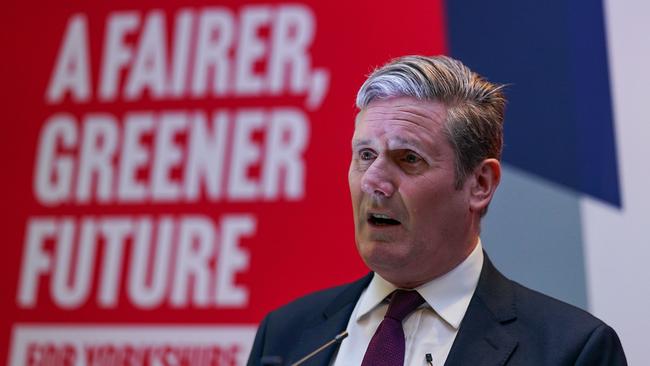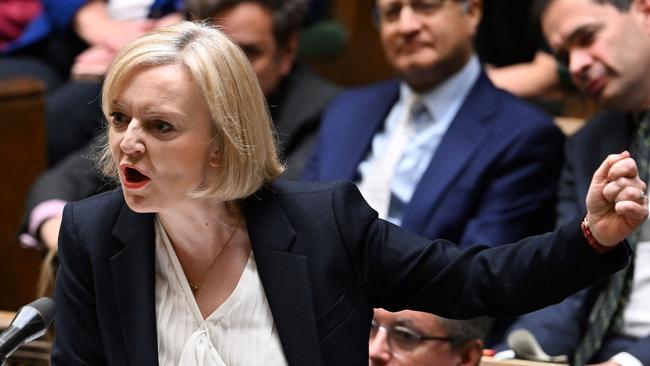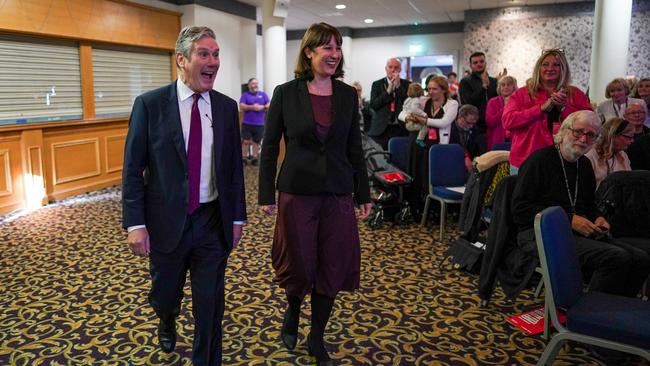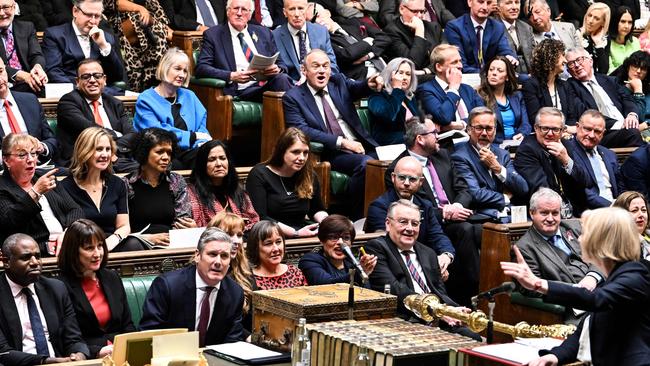For UK voters, it’s ‘what’s the point?' for Labour

Liz Truss demanded to know of Sir Keir Starmer, in effect, why he hadn’t stopped the planned rail strikes. Her question, he retorted, showed Labour was now the government in waiting and her party was an opposition in waiting.

He wasn’t wrong, but sometimes you have to mark just how quickly things can change. For me the high point of Labour’s psychological commitment never to be in government again came four years ago in Liverpool. A debate on foreign affairs was accompanied by a mass waving of Palestinian flags from delegates on the conference floor.
Now, the Palestinian flag is a perfectly good flag but the flags of no other country had been waved and it happened in the context of the acrimonious debate raging in the party over antisemitism. Only the dim didn’t know what it meant.
Forty-eight months later Labour delegates, once again in Liverpool, stood and sang God Save the King. There was a different leader, and to a large extent they were different delegates. The assorted hard-left ideologues and misguided idealists who followed them have been steadily leaving the party or been sidelined within it.

The brutal game of purge thy neighbour, practised by whichever side controls the national executive committee and the political narrative, has seen some important victories for the leadership.
Last week, the Corbynite MP for Ilford South, Sam Tarry, selected in the Jeremy Corbyn-era after a machination that would have made Lenin proud, was deselected in a vote of more than 800 local party members, the first such deselection in a decade.
A few days later the former MP for Kensington and the Stop the War supporter Emma Dent Coad was ruled out of standing for Labour in her old constituency. The howls from the far left, which once were audible on the moon, now barely escape from the confines of their own social media.
That was one kind of difficult job Starmer needed to do, and he’s largely done it, and it’s a huge achievement. It was the first necessary but insufficient precondition for power. But by the time the process was well under way, and partly as a result of it, Labour had still not presented itself as a party with something useful to say.
This moment of apparent irrelevance reached its own nadir at the Hartlepool by-election, which Labour lost. That was just 18 months ago. A few weeks later it held the Batley and Spen constituency but with a reduced vote share and unreduced “grumbles” about the leadership. Starmer was boring, uncharismatic, no one knew what he stood for … yada yada.

Today, hardly more than a year on, politics as tomfoolery no longer holds the attraction it once did. And Labour finds itself with polling leads that are terrifying its own candidates selected for “no-hope” seats they had been assured they couldn’t possibly win.
Now, as one of his senior colleagues said to me this week, Labour has a leader “whose demeanour and internal DNA are suited to the moment”. So the second Task of Starmer (the Augean stable having been cleansed) – putting Labour in serious contention – is also largely completed.
It’s at this point that the famous metaphor confided by the late Roy Jenkins to the last Labour leader of the opposition to become prime minister comes to mind. Starmer now has the priceless Ming vase in his hands and a stretch of parquet flooring to cross. You could forgive him for approaching the journey with a nervous timidity. Which of course will see him being assailed with renewed claims that he has no ambitions of his own for the country.
But now just putting the place back together again looks like a radicalism of its own. “I don’t think,” said my senior Labour person, “that you should underestimate the importance of ‘stop the crazies’.” In his view, first politics and then the economy had been “corroded by the notion that all you need is blind faith, where everyone opposed is a right-wing sell-out or a left-wing tofu-eater”.
Today, he believes, we have to rebuild our institutions and become once again politically serious. And he doesn’t think the electorate will have faith in a Labour equivalent of Johnson-Truss “wishlist” boosterism.
In other words, in a week of governmental reversals (and even re-reversals) on key policies which affect the livelihoods of voters, Labour’s first task in government is to re-establish the belief that Britain is competently governed. Which at other times would be an unexciting prospect. But not now.
There was a hint of Labour toning down its own promises this week when Starmer made a speech referring to how some of its ambitions would probably be delayed by the economic mess he will inherit. And in any case, it makes no sense to respond to every twist in government policy by saying what Labour would do about it in the event of an election that isn’t about to happen.
But all the same there will have to be something more than this. Already there’s a mood among the influencers that the lesson of the last month is that a change of government can change nothing. If Labour has any large ambitions, runs this argument, it won’t be able to afford them without risking its own markets-led crisis, so what’s the point?
And yet there are big things that absolutely need to be done, and if they’re not our lives will just get worse. The problems consequent on an ageing population and on climate change are the biggest challenges, but there are others.
There are some obvious areas where we can gain something by ditching dogma, such as by re-establishing a closer trading relationship with Europe.
But for the rest I don’t accept that Britain has somehow reached the magic optimal point for what can be raised through taxation and note that a number of more successful countries than us have higher government spending to GDP ratios.
But the money has to be spent well. We have to innovate in health and education, invest in resilience and security and act to improve productivity, not least by reforming planning.
So, yes, both hands on the Ming vase, Keir. But in your pocket, its headlines visible to all bystanders, a clear statement of priorities.
The Times




So there came that moment that seems to arrive in the last days of all dying governments, the one where, at prime ministers’ questions, a prime minister finds themselves asking the questions to the leader of the opposition.